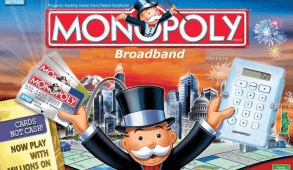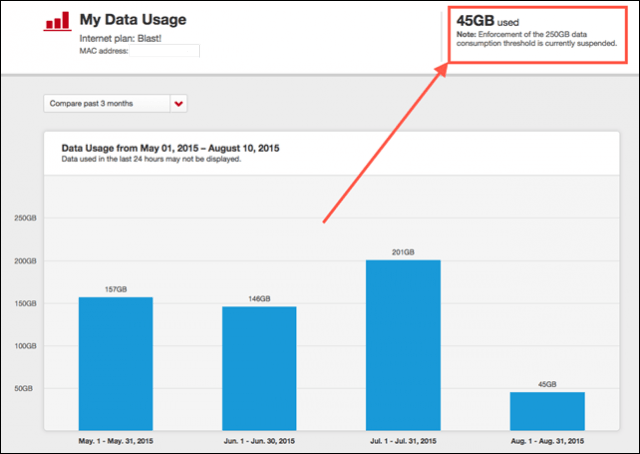
“Note: Enforcement of the 250GB data consumption threshold is currently suspended.” (Image: Houston Chronicle)
AT&T’s enforces usage caps with overlimit penalties on its slow speed DSL service while waiving overlimit fees for its higher speed U-verse Internet service.
In 2011, AT&T introduced a 150GB monthly data cap on its DSL customers and a 250GB cap on U-verse Internet access, promising an overlimit fee of $10 for each 50GB customers stray over their allowance. Since that time, although AT&T continues to claim all customers have a usage allowance, it only penalizes DSL customers with overlimit fees.
What makes one customer subject to a higher bill while another can use as much data as they like without penalty? Competition.
Stop the Cap! has found AT&T’s DSL customers are among those least favored by the phone company. Subjected to a data cap with penalty fees for exceeding the allowance is just one of the issues bothering customers like Sheila Rivers, who lives on Houston’s west side. Her Internet bill has gone up year after year no matter how much data she uses. Her phone line with DSL used to cost her around $45 a month. Last year, it increased to $65 and AT&T has now informed her they want another $10 a month, bringing her phone bill to almost $75 a month. As long as it hasn’t rained recently, she gets just under 6Mbps speeds from AT&T. This past spring her connection barely exceeded 2Mbps.
When Rivers complains about her bill, she is quickly offered U-verse at about half the price for faster speeds. She’d take advantage of the offer, except she can’t. AT&T’s engineers tell her there are “no more ports” open in her neighborhood at the moment.
That’s also true for Jim in downtown Chicago. He’s an AT&T DSL customer and not by choice. AT&T was supposed to upgrade his building to U-verse more than a year ago, but it still has not happened. Comcast has a record of delivering appallingly bad service in his building, judging from his neighbors who cannot stay connected to Comcast’s Internet service. That leaves him with AT&T DSL with that 150GB usage cap. He regularly pays $30 in overlimit fees every month for exceeding it.
“AT&T won’t budge on waiving the extra fees on DSL, unless I agree to sign up for U-verse and then they will issue me a courtesy credit,” Jim tells Stop the Cap! “I keep telling them ‘yes, please’ and around a day later I receive another call canceling my order because U-verse is not available in the building. It’s clear the DSL usage cap is supposed to convince people to switch to U-verse for a bigger allowance.”
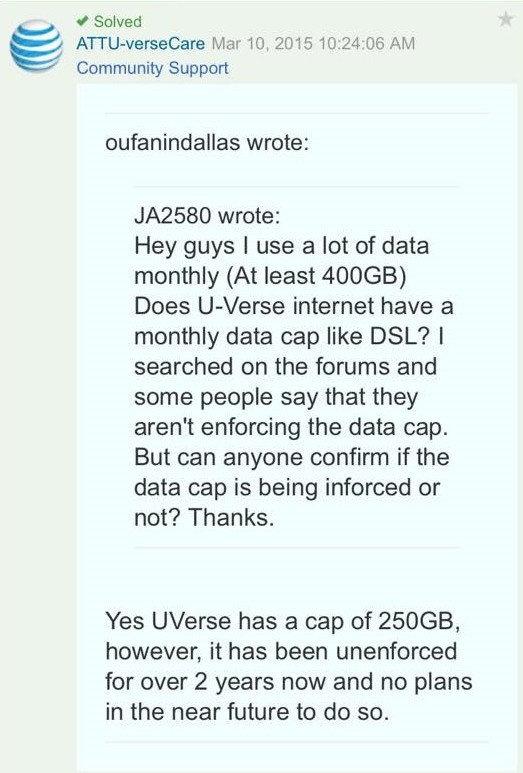
(Image: Houston Chronicle)
Except AT&T has not enforced its 250GB usage allowance with overlimit fees anywhere we could find. In fact, customers tell us they are specifically exempted from any U-verse caps based on a message they see on AT&T’s usage measurement tool:
Note: Enforcement of the 250GB data consumption threshold is currently suspended.
This week, the Houston Chronicle’s TechBlog reports usage caps for U-verse have been suspended across the city of Houston. AT&T’s current reasoning for harshly enforcing caps on its DSL service while not enforcing them at all for U-verse customers was murky:
“We’re educating our customers on Internet usage, and we inform them if their usage might affect their monthly bill.”
So what is different about AT&T’s lower speed DSL service that presumably generates less traffic than its higher speed U-verse counterpart?
The answer seems to be competition.
AT&T has aggressively upgraded many of their urban and suburban service areas to U-verse. That upgrade alone does not mean the end of DSL for customers in an upgraded area, but AT&T has clearly embarked on an effort to convince customers to abandon older DSL service in favor of U-verse. In most cases this is accomplished with promotional pricing, dramatically reducing the cost of U-verse and convincing customers sticking with DSL is an expensive mistake.
AT&T also faces cable competition in nearly 100% of their U-verse service areas — competition that has raised broadband speeds and cut prices for new customers. If the competition offers faster Internet speeds with no usage cap, toughing it out with AT&T U-verse may seem unwise. Enforcing that 250GB cap would likely drive a number of customers to the competition.
In contrast, more rural and outer suburban communities are less likely to have a cable competitor and much more likely to qualify only for DSL because AT&T has not upgraded those areas to U-verse. That leaves AT&T with a monopoly, where customers have no other choices for service. It is very easy to enforce usage caps in these areas.
“It doesn’t make any sense that AT&T would cap me to 150GB on my DSL line and charge me overlimit fees for using too much when my next door neighbor with U-verse can use the Internet 24/7 and never be asked to pay anything extra for doing it,” Rivers said. “It rubbed me wrong enough to call Comcast, where I was offered more than 10 times faster service with cable TV thrown in for $15 less than what AT&T has been charging me and no usage caps for now at least. I can’t stand Comcast but AT&T is worse.”
Rivers thinks AT&T is making a big mistake having usage caps at all.
“That one issue just cost them my business after eight years with them.”


 Subscribe
Subscribe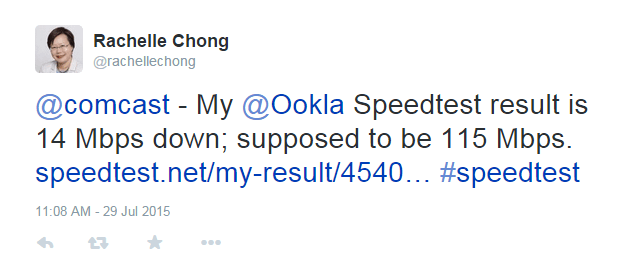

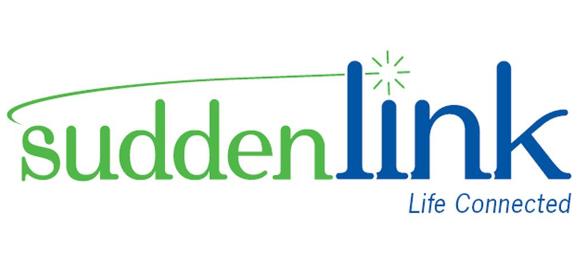 Suddenlink’s Operating GigaSpeed has reached parts of Texas, Missouri and North Carolina — the first areas to get 1,000/50Mbps service from the cable company. But customers are not happy to learn it is accompanied by a 550GB usage cap.
Suddenlink’s Operating GigaSpeed has reached parts of Texas, Missouri and North Carolina — the first areas to get 1,000/50Mbps service from the cable company. But customers are not happy to learn it is accompanied by a 550GB usage cap.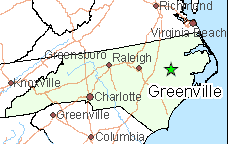 “Here in Greenville they are charging $110 a month for the service, $5 for a cable modem or $10 for a Wi-Fi router, and a $35 mandatory technician visit fee which sounded reasonable until they mentioned there was a 550GB data allowance on the service,” said Stop the Cap! reader J.J. Wallace. “That killed it for me. That is nothing short of outrageous to charge that kind of money and place a ridiculously low cap on it. It’s funny
“Here in Greenville they are charging $110 a month for the service, $5 for a cable modem or $10 for a Wi-Fi router, and a $35 mandatory technician visit fee which sounded reasonable until they mentioned there was a 550GB data allowance on the service,” said Stop the Cap! reader J.J. Wallace. “That killed it for me. That is nothing short of outrageous to charge that kind of money and place a ridiculously low cap on it. It’s funny 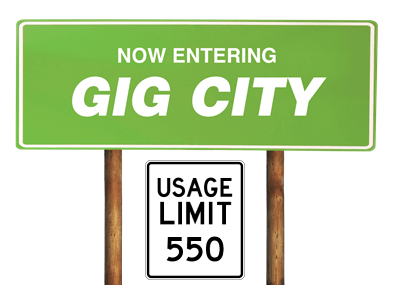 “If you impress on them they are charging too much, they will often find a promotion for you, but so far I’ve had no luck getting them to waive the caps unless you switch to business service,” said Wallace. “They always act like you are the first person to complain about usage caps, but if you read their social media pages, there are many others very upset to find they’ve lost unlimited use service after Suddenlink introduced speed upgrades. Most of my friends would rather have unlimited than faster service you can’t use.”
“If you impress on them they are charging too much, they will often find a promotion for you, but so far I’ve had no luck getting them to waive the caps unless you switch to business service,” said Wallace. “They always act like you are the first person to complain about usage caps, but if you read their social media pages, there are many others very upset to find they’ve lost unlimited use service after Suddenlink introduced speed upgrades. Most of my friends would rather have unlimited than faster service you can’t use.” Comcast will challenge cord cutting and entice cord-nevers with
Comcast will challenge cord cutting and entice cord-nevers with  Comcast will deliver Stream over the same network it uses for content delivery to game consoles that does not count against Comcast’s
Comcast will deliver Stream over the same network it uses for content delivery to game consoles that does not count against Comcast’s  A well-placed source in Washington, D.C. with knowledge of the matter tells Stop the Cap! the Federal Communications Commission is prepared to take a hard look at the issue of Internet data caps and usage-based billing if a major cable operator like Comcast imposes usage allowances on its broadband customers nationwide.
A well-placed source in Washington, D.C. with knowledge of the matter tells Stop the Cap! the Federal Communications Commission is prepared to take a hard look at the issue of Internet data caps and usage-based billing if a major cable operator like Comcast imposes usage allowances on its broadband customers nationwide.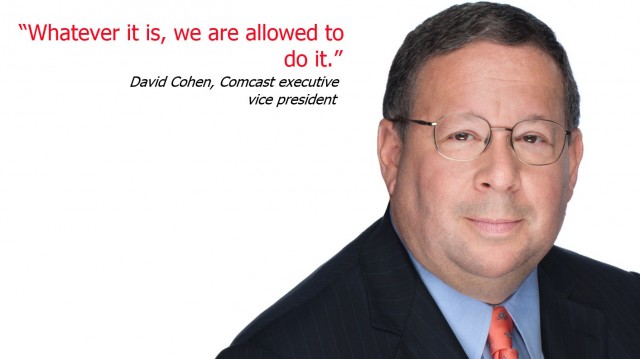 “I’ve reviewed [the] account to see and can confirm the charges are valid,” responded a Comcast representative who defended the company’s usage cap trials. “Please understand that we are not here to take advantage of customers. We are here to provide a great customer service experience. After researching [the] account, at this time no matter what level of service you obtain, the Internet usage [allowance] will remain the same.”
“I’ve reviewed [the] account to see and can confirm the charges are valid,” responded a Comcast representative who defended the company’s usage cap trials. “Please understand that we are not here to take advantage of customers. We are here to provide a great customer service experience. After researching [the] account, at this time no matter what level of service you obtain, the Internet usage [allowance] will remain the same.”